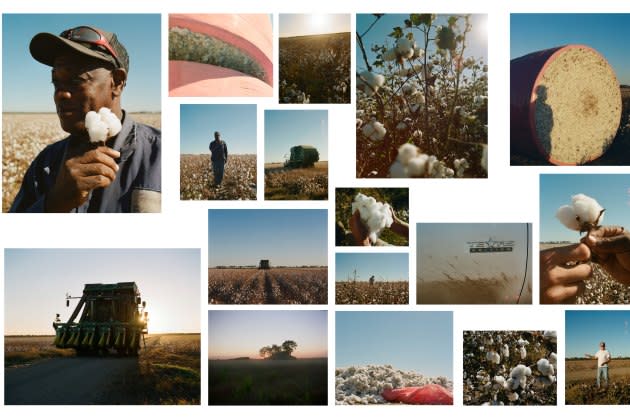Why Citizens of Humanity, Kiss the Ground Are Taking on Regenerative Agriculture

Due to the severity of the climate crisis and cotton’s global impact, fashion brands are looking to help farmers fast-track adoption of regenerative agricultural practices.
A new partnership between The Citizens of Humanity Group (including brands Citizens of Humanity, Agolde and Goldsign) and environmental nonprofit Kiss the Ground is poised to do just that.
More from WWD
The brands will launch “Kiss the Ground Cotton,” as part of their fall 2023 collections and beyond. The program is meant to earmark more sustainable decisions for consumers (since regenerative practices help drawdown carbon) while bolstering the work of Kiss the Ground with endowments for each pound of cotton produced.
Though incoming review from the Federal Trade Commission may look to regulate the use of “regenerative” in marketing messages as part of its updated Green Guides, the groups maintain that waiting any longer isn’t an option.
“A holistic approach is crucial for regeneration,” said Ryland Englehart, chief mission officer and cofounder of Kiss the Ground, known for a documentary of the same name.
“We are at an interesting inflection point where we can celebrate that the term ‘regenerative agriculture’ is being adopted by consumer awareness and by some of the largest corporations as their aspirational north star,” Englehart said. “As more and more brands enter the space, it will be critical that, as a community and industry, we aren’t thinking in terms of a marketing campaign, [but] instead how can we be thinking about investing in farmers to have the financial resources, training, markets and building a direct human relationship of trust and accountability?”
Together, Citizens of Humanity Group and Kiss the Ground will work alongside Advancing Eco Agriculture, a regenerative farming consultancy with 15 years of experience in the space. AEA’s involvement is meant to provide on-farm mentorship and support.
“I have visited the farms we are engaging with and have seen the commitment and passion of these growers to be part of this regenerative transition program,” continued Englehart. “We hope many more brands join us in this journey of small meaningful steps that can improve farmer livelihood, environmental health and public health as a path of regeneration.”
Much of this on-the-ground work is seen in the “Kiss the Ground” documentary, which debuted in 2020 and featured Woody Harrelson (who is narrator), Gisele Bündchen, Tom Brady and Ian Somerhalder among the star-studded cast.
Whatever the medium for sharing the regenerative message, both teams stress that a “one size fits all” approach doesn’t work for agricultural transitions of scale.
Last year, more than 12.5 million acres of cotton were planted in the U.S., per The U.S. Department of Agriculture’s “Planted Acres” report from June 30. As part of the Kiss the Ground Cotton partnership, five U.S. farmers were part of the program producing 1 million pounds of cotton. In 2023, the program looks to double its participants in the U.S., with a similar program following suit in Turkey. Participating farmers are paid a premium above cotton market prices, and the program subsidies span material costs that will improve soil and plant health, expertise, as well as cash advances to ease farmer transitions to regenerative agriculture.
The current scale of production equates to more than 700,000 products (with items such as knit tops requiring less cotton per garment than a pair of jeans).
Amy Williams, chief executive officer of Citizens of Humanity Group, told WWD that the company will conduct annual auditing of each farm in its program to ensure methods are followed.
Williams reiterated, “Adopting regenerative cotton into our products is one of the most effective changes we can make to support our environment. Working with Kiss the Ground and AEA is critical to doing this in the most thoughtful manner. We are excited by the early interest from other brands and retail partners to adopt and utilize [Kiss the Ground] Cotton in their own products, as the widespread adoption of these farming practices into the apparel industry can have a meaningful effect on our future.”
